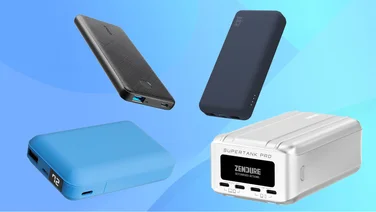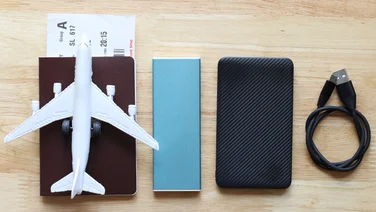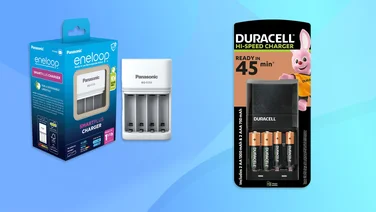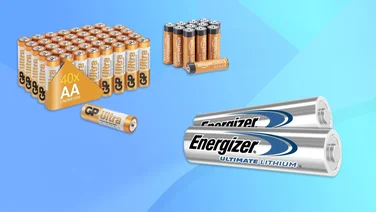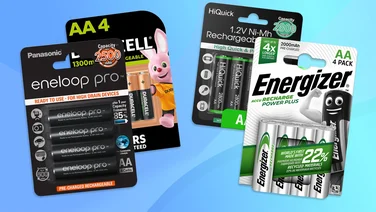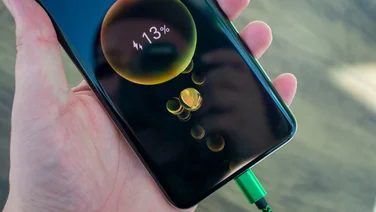To help us provide you with free impartial advice, we may earn a commission if you buy through links on our site. Learn more
- Best leisure batteries: At a glance
- Aren’t leisure batteries all the same?
- Leisure batteries: which one is right for me?
- Anything else?
- The best leisure batteries you can buy in 2024
- 1. Royal Battery SuperBatt DT120: Best all-round leisure battery
- 2. Renogy 12V 100Ah LifePO4 Smart Lithium Iron Phosphate Battery: Best high-end leisure battery
- 3. Platinum Leisure Plus Battery 12V 110AH: Best leisure battery on a budget
- 4. Platinum Plus Leisure Battery 12V 100Ah: Best leisure battery for motorhomes
- 5. Lucas LX31MF Deep Cycle Battery: Best AGM leisure battery for recharge cycles

Looking for an ultra-reliable leisure battery to keep you fully charged up when away from home? The best leisure batteries will keep you powered up while you’re out and about in your caravan or motor boat, but what features should you look out for? Our buying guide tells you everything you need to know about choosing a leisure battery whatever your intended use, before we plug into our selection of the best leisure batteries you can buy.
Best leisure batteries: At a glance
- Best all-round leisure battery: Royal Battery SuperBatt DT120
- Best high-end leisure battery: Renogy 12V 100Ah LifePO4 Smart Lithium
- Best leisure battery on a budget: Platinum Leisure Plus Battery
Leisure batteries are an essential part of the caravanning or boating experience as they provide all the electrical power to keep the lights on, charge our ever-increasing number of digital devices and, in the case of more modern caravan owners, use exterior electronics such as motor movers to position vans and boats without a vehicle.
With such dependency on your leisure battery, why take a chance with the first cheap option you come across when there’s every chance it could suddenly leave you cut off from communication and, quite literally, in the dark?
To save you from falling into that potentially powerless position, we’ve rounded up the very best of the current batch of leisure batteries, each a powerhouse of performance that will let you keep the lights on from dusk till dawn.
Aren’t leisure batteries all the same?
Looks aside, absolutely not. For a start they differ in the tech that they use. There are absorbed glass mat (AGM) batteries, flooded lead acid batteries, sealed lead acid batteries, gel batteries, lithium LiFePO4 batteries and lead crystal batteries. Each works differently; some are cheaper than others, some require more maintenance and some are more hard-wearing, but which type of leisure battery you require depends on both your budget and what kind of demands you’re going to place on it.
AGM batteries
Developed for use by the military in the 1980s, AGMs are lead-acid batteries that are extremely resistant to vibration, making them ideal for use on the go. Using an electrolyte-containing ultra-thin fibreglass mat sandwiched between lead plates steeped in sulphuric acid, AGMs are maintenance-free and completely sealed to eliminate any chance of spillage. AGM leisure batteries can also be discharged below 50% without fear of causing damage, but they are more expensive than flooded and sealed lead acid batteries.
Flooded lead acid leisure batteries
The Flooded Lead Acid option is where batteries all began, but they’re still very much in use today. Consisting of lead plates suspended in free-flowing sulphuric acid and electrolyte (distilled water), they’re cheap, cost-effective and long-lasting owing to the fact that you can top up the water when running low.
Sealed lead acid leisure batteries
These are in essence the same as flooded lead acid batteries, except you can’t open them to top up the electrolytes. How is this a good thing? Well, there’s considerably less chance of spilling sulphuric acid over yourself, which is a definite plus. Both flooded and sealed batteries run the risk of permanent damage if discharged below 50%.
Gel leisure batteries
Keeping things leak- and fuss-free, gel batteries are of a similar makeup to AGM batteries, but instead of using a fibreglass mat, the electrolyte is a thick gel. Other than that, they’re the same, with the same leak-free advantages. In addition, gel leisure batteries can be discharged down to 80% without resulting in damage. However, they’re rare in the UK.
Lithium LiFePO4 leisure batteries
The same battery you’ll find in electric cars, lithium LiFePO4 leisure batteries are better than lead acid in pretty much every way: they can provide almost double the energy at half the weight, they have a much longer working life and feature electronic controllers to stop them discharging to the point of damage. However, they also cost quite a lot more as a consequence.
Lead crystal leisure batteries
A bit like the AGM leisure battery design, but with a completely different makeup, lead crystal (LC) leisure batteries use a micro-porous super-absorbent mat (SAM), high-purity lead calcium selenium plates and a safe SiO2 electrolyte solution. LC batteries can be discharged completely and also recharged from flat without any damage and can offer three times the lifespan of lead acid batteries. Naturally, this all comes at a price.
READ NEXT: The best camping stove
Apart from the different designs, there are also three different classes; A, B and C, as determined by the National Caravan Council. Class A is a powerful option for going off-grid and powering just about everything without an electric hook-up; Class B is for pitches with electric hook-up and more for lights and, say, motor movers; and Class C is for keeping your lights on with an electric hook-up.
Leisure batteries: which one is right for me?
That all depends on your budget and what kind of use you expect to get out of your leisure battery. Hopefully, the brief descriptions above should already have steered your mind in the direction you need to go, but you’ll also need to think about what size battery you require.
All leisure batteries output at 12V, and how long a fully charged battery will last (in amp hours, or Ah) depends on how much current is drawn from it. As a rough guide, if your battery is 100Ah it will provide 100 amps for one hour or one amp for 100 hours. If the appliance you’re powering doesn’t state how many amps it requires, you can work it out as follows Watts ÷ Volts = Amps. So, work out what appliances you’ll be powering simultaneously and get the calculator out.
If you’ll be using your leisure battery to start engines, you’ll also want to take the CCA (cold cranking amp) rating into consideration. This rates the battery’s ability to start engines in cold weather. Anything around 650 CCA is good to fire things up in the ice, while 880 will guarantee to get you on the go in any weather. Some leisure batteries are better for starts and some are better for running appliances, although some – on the pricier side – are dual-purpose, so that’s important to take into account.
Also, you’ll want to take into consideration how many recharge cycles your battery can handle before giving up the ghost. The more a battery can do, the better, obviously. These are generally referred to as “deep-cycle” leisure batteries.
READ NEXT: The best sat nav to buy
Finally, when looking at the capacity of your battery, consider the physical size: will it actually fit into the space you have? This, I think it’s fair to say, is a crucial consideration.
Anything else?
Yes – protect your battery by ensuring it’s held securely, grease the terminals and use quality clamps, and check regularly for rust. Also, wear safety equipment when inspecting your battery and, when charging your battery, remember that your charger needs to produce an output of at least 10% of your battery’s capacity. Other than that, happy trails.
The best leisure batteries you can buy in 2024
1. Royal Battery SuperBatt DT120: Best all-round leisure battery

Price: £120 | Buy now from Amazon
One of the most powerful leisure battery models available from this highly reputable brand, the Royal Battery SuperBatt DT120 is a highly versatile deep-cycle option that’s equally at home on land and at sea, at the service of caravans, motorhomes or ocean-going yachts alike. What’s more, it can be used as both an engine starter and an auxiliary power supply.
A massively popular choice among those who know their electric onions within the world of leisure batteries, the SuperBatt DT120 is maintenance-free and offers a long life thanks to Advance Calcium Technology, while its heavy-duty build makes it ready to roll in any environment.
Offering ample power for all and rated at 880 CCA, cold starts are never going to be a problem again with this beast of a battery. But, as impressive an option as this is, be sure to check both the dimensions and polarity layout (the position of the positive and negative posts) of your vehicle by checking against your old battery so you can be certain the SuperBatt DT120 is compatible with the space available.
Key specs – Type: AGM; Capacity: 120Ah; Voltage: 12V; Usage: Caravan, motorhome, marine; Dimensions: 33 x 17.2 x 24.2cm; Warranty: 2 years
2. Renogy 12V 100Ah LifePO4 Smart Lithium Iron Phosphate Battery: Best high-end leisure battery

Price: £550 | Buy now from Amazon
Lithium-based leisure batteries tend to cost quite a bit more than their contemporaries and this portable powerhouse, the snappily named 12V 100Ah LifePO4 Smart Lithium Iron Phosphate Battery from Renogy, proves just that, weighing in at well over £400. But you get a lot for your money.
A definite consideration for anyone who uses their caravan or motorhome a lot (even, perhaps, living in it), this lightweight option (lithium batteries weigh considerably less than lead acid ones) is capable of a whopping 4,000 cycles at 80% Depth of Discharge (DoD), whereas AGM batteries provide only 50%, so you get a huge lifecycle and 30% more amp hours, meaning you could get as much as a decade’s worth of work out of the Renogy without worry.
Featuring an onboard state-of-the-art battery management system with high-performance dual-processors, the battery protects itself from overcharging, shorting out and overheating while maintaining a balanced voltage across all cells, so you’ll never need to worry about it.
What’s more, switching to shelf mode means the Renogy will have a low self-discharge rate to keep it protected when not in use.
Key specs – Type: Lithium LiFePO4; Capacity: 100Ah; Voltage: 12V; Usage: Caravan, motorhome, marine; Dimensions: 28.9 x 17.2 x 18.7cm; Warranty: 5 years
3. Platinum Leisure Plus Battery 12V 110AH: Best leisure battery on a budget

Price: £86 | Buy now from Tayna Batteries
If your off-grid demands are not too great or you tend to spend most of your caravan/motorhome time hooked up to site power, then you probably won’t need to spend a small fortune on an all-singing, all-dancing option, but rather just a well-designed sealed lead acid leisure battery costing comfortably under £100.
While the Platinum Leisure Plus may not be the absolute cheapest of its kind, it is produced by a reputable brand, so the extra bit of cash spent on it will buy you peace of mind.
Plug this C Class battery into your campsite pitch and you’ll never have a problem. If, on the other hand, you’re going “back to nature”, it will keep the lights on, but you may want to reduce the number of appliances you expect it to attend to.
Sealed and spill-proof, you won’t be able to top it up in the way you can flooded lead acid batteries, but this also means it’s always safe to handle and maintenance-free.
Key specs – Type: Sealed lead acid; Capacity: 110Ah, Voltage: 12V; Usage: Caravan; Dimensions: 32.8 x 17.1 x 23.7cm; Warranty: 2 years
4. Platinum Plus Leisure Battery 12V 100Ah: Best leisure battery for motorhomes

Price: £170 | Buy now from Amazon
Another bit of leisure battery brilliance from Platinum, the Plus Leisure is an A Class entry, which makes it particularly appealing to caravan, motorhome or campervan owners who like to get off the beaten track. Particularly at the price which, compared to the Renogy lithium battery, is a mere pittance.
Your best bet for long weekend breaks or even the annual two-week holiday, this low-profile AGM leisure battery benefits from ‘Spill Proof Technology’, meaning it’s maintenance-free, along with Calcium Plate Technology for longer life. It’s also built to last and is resilient to vibrations when you travel.
Another plus point, as it’s an AGM, it can also be charged via solar panels, so if you’re off on some epic tour of Europe, you can use portable panels to charge it during stopovers.
A great, powerful leisure battery at the price, the Platinum Plus Leisure also provides up to five times’ more charge cycles than standard batteries.
Key Specs – Type: AGM; Capacity: 100Ah; Voltage: 12v; Usage: Caravan, Motorhome; Dimensions: 35.4 x 17.5 x 19cm; Warranty: 3 years
5. Lucas LX31MF Deep Cycle Battery: Best AGM leisure battery for recharge cycles

Price: £130 | Buy now from Amazon
An AGM battery similar to the Royal Battery SuperBatt, you may notice that the Lucas option offers fewer amp hours for more money, and you’d be right. However, unlike most of its model types, the Lucas is a deep cycle battery that’s capable of a staggering 500 recharge cycles, as opposed to the 100–150 of other AGMs. What’s more, you get a year extra on your warranty compared to the SuperBatt.
Also firmly in the Lucas’ favour, should you need to be starting any engines up, it’s capable of 900 CCA, which is enough to start Frankenstein’s monster, let alone any vehicle, no matter how cold, and has a 70% DoD (Depth of Discharge), giving you more power than most.
A low self-discharge rate gives long shelf life when not in use, and a handy carrying handle on the top makes it easy to move from location to location.
Key specs – Type: AGM; Capacity: 105Ah; Voltage: 12V; Usage: Caravan, motorhome, marine; Dimensions: 32.99 x 17.2 x 24.21cm; Warranty: 3 years




